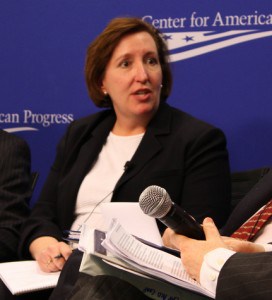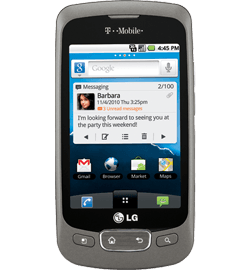WASHINGTON – The Department of Justice today filed a civil antitrust lawsuit to block AT&T Inc.’s proposed acquisition of T-Mobile USA Inc. The department said that the proposed $39 billion transaction would substantially lessen competition for mobile wireless telecommunications services across the United States, resulting in higher prices, poorer quality services, fewer choices and fewer innovative products for the millions of American consumers who rely on mobile wireless services in their everyday lives.
The department’s lawsuit, filed in U.S. District Court for the District of Columbia, seeks to prevent AT&T from acquiring T-Mobile from Deutsche Telekom AG.
“The combination of AT&T and T-Mobile would result in tens of millions of consumers all across the United States facing higher prices, fewer choices and lower quality products for mobile wireless services,” said Deputy Attorney General James M. Cole. “Consumers across the country, including those in rural areas and those with lower incomes, benefit from competition among the nation’s wireless carriers, particularly the four remaining national carriers. This lawsuit seeks to ensure that everyone can continue to receive the benefits of that competition.”
“T-Mobile has been an important source of competition among the national carriers, including through innovation and quality enhancements such as the roll-out of the first nationwide high-speed data network,” said Sharis A. Pozen, Acting Assistant Attorney General in charge of the Department of Justice’s Antitrust Division. “Unless this merger is blocked, competition and innovation will be reduced, and consumers will suffer.”
Mobile wireless telecommunications services play a critical role in the way Americans live and work, with more than 300 million feature phones, smart phones, data cards, tablets and other mobile wireless devices in service today. Four nationwide providers of these services – AT&T, T-Mobile, Sprint and Verizon – account for more than 90 percent of mobile wireless connections. The proposed acquisition would combine two of those four, eliminating from the market T-Mobile, a firm that historically has been a value provider, offering particularly aggressive pricing.
According to the complaint, AT&T and T-Mobile compete head to head nationwide, including in 97 of the nation’s largest 100 cellular marketing areas. They also compete nationwide to attract business and government customers. AT&T’s acquisition of T-Mobile would eliminate a company that has been a disruptive force through low pricing and innovation by competing aggressively in the mobile wireless telecommunications services marketplace.
The complaint cites a T-Mobile document in which T-Mobile explains that it has been responsible for a number of significant “firsts” in the U.S. mobile wireless industry, including the first handset using the Android operating system, Blackberry wireless email, the Sidekick, national Wi-Fi “hotspot” access, and a variety of unlimited service plans. T-Mobile was also the first company to roll out a nationwide high-speed data network based on advanced HSPA+ (High-Speed Packet Access) technology. The complaint states that by January 2011, an AT&T employee was observing that “[T-Mobile] was first to have HSPA+ devices in their portfolio…we added them in reaction to potential loss of speed claims.”
The complaint details other ways that AT&T felt competitive pressure from T-Mobile. The complaint quotes T-Mobile documents describing the company’s important role in the market:
-
T-Mobile sees itself as “the No. 1 value challenger of the established big guys in the market and as well positioned in a consolidated 4-player national market”; and
-
T-Mobile’s strategy is to “attack incumbents and find innovative ways to overcome scale disadvantages. [T-Mobile] will be faster, more agile, and scrappy, with diligence on decisions and costs both big and small. Our approach to market will not be conventional, and we will push to the boundaries where possible. . . . [T-Mobile] will champion the customer and break down industry barriers with innovations. . . .”
The complaint also states that regional providers face significant competitive limitations, largely stemming from their lack of national networks, and are therefore limited in their ability to compete with the four national carriers. And, the department said that any potential entry from a new mobile wireless telecommunications services provider would be unable to offset the transaction’s anticompetitive effects because it would be difficult, time-consuming and expensive, requiring spectrum licenses and the construction of a network.
The department said that it gave serious consideration to the efficiencies that the merging parties claim would result from the transaction. The department concluded AT&T had not demonstrated that the proposed transaction promised any efficiencies that would be sufficient to outweigh the transaction’s substantial adverse impact on competition and consumers. Moreover, the department said that AT&T could obtain substantially the same network enhancements that it claims will come from the transaction if it simply invested in its own network without eliminating a close competitor.
AT&T is a Delaware corporation headquartered in Dallas. AT&T is one of the world’s largest providers of communications services, and is the second largest mobile wireless telecommunications services provider in the United States as measured by subscribers. It serves approximately 98.6 million connections to wireless devices. In 2010, AT&T earned mobile wireless telecommunications services revenues of $53.5 billion, and its total revenues were in excess of $124 billion.
T-Mobile, is a Delaware corporation headquartered in Bellevue, Wash. T-Mobile is the fourth-largest mobile wireless telecommunications services provider in the United States as measured by subscribers, and serves approximately 33.6 million wireless connections to wireless devices. In 2010, T-Mobile earned mobile wireless telecommunications services revenues of $18.7 billion. T-Mobile is a wholly-owned subsidiary of Deutsche Telekom AG.
Deutsche Telekom AG is a German corporation headquartered in Bonn, Germany. It is the largest telecommunications operator in Europe with wireline and wireless interests in numerous countries and total annual revenues in 2010 of €62.4 billion.
Download a copy of the Complaint (PDF)
Deputy Attorney General James M. Cole Speaks at the AT&T/T-Mobile Press Conference
Washington, D.C. ~ Wednesday, August 31, 2011
[flv]http://www.phillipdampier.com/video/CNBC Cole Comments on Merger Opposition 8-31-11.flv[/flv]
Good morning. Millions of Americans rely on mobile wireless telecommunications services in their everyday lives. Whether you are a parent using a cell phone to check up on your teenager or a working professional using a laptop or smart phone to conduct business or surf the web, mobile wireless communications plays a vital – and increasing – role in our daily lives.
We all reap the benefits of this incredible technology because there has been fierce competition in this industry, which has brought all of us innovative and affordable products and services.

Cole
In order to ensure that competition remains and that everyone – including consumers, businesses and the government – continues to receive high quality, competitively priced mobile wireless products and services, the Department of Justice today filed an antitrust lawsuit in U.S. District Court in Washington, D.C. to block AT&T’s acquisition of T-Mobile.
The Department filed its lawsuit because we believe the combination of AT&T and T-Mobile would result in tens of millions of consumers all across the United States facing higher prices, fewer choices and lower quality products for their mobile wireless services.
Consumers across the country, including those in rural areas and those with lower incomes, have benefitted from competition among the nation’s wireless carriers, particularly the four remaining national carriers. This lawsuit seeks to ensure that everyone can continue to reap the benefits of that competition.
Right now, four nationwide providers account for more than 90 percent of the mobile wireless connections in America, and preserving competition among them is crucial. For instance, AT&T and T-Mobile currently compete head-to-head in 97 of the nation’s largest 100 cellular marketing areas. They also compete nationwide to attract business and government customers. Were the merger to proceed, there would only be three providers with 90 percent of the market, and competition among the remaining competitors on all dimensions—including price, quality, and innovation—would be diminished.
As can be seen in the Department’s complaint, AT&T felt competitive pressure from T-Mobile. One example cites an AT&T employee observing that “[T-Mobile] was first to have HSPA+ devices in their portfolio…we added them in reaction to potential loss of speed claims.”
So as you can see, a merged AT&T and T-Mobile would combine two of the four largest competitors in the marketplace, and would eliminate T-Mobile, an aggressive competitor, from the market.
Although there has been a leadership change in the Antitrust Division, one thing has not changed – the Division will remain steadfast in its mission to vigorously enforce the antitrust laws.
And that’s what the Department has done today. The leadership transition has been seamless and the right decision was reached in this case.
We are seeking to block this deal in order to maintain a vibrant and competitive marketplace that allows everyone to benefit from lower prices and better quality and innovative products.
I want to express my own deep gratitude for the efforts of so many members of the Antitrust Division staff who have tremendous expertise in this important industry. And Sharis, I want to thank you for your leadership in this effort. You and your team have done the right thing for consumers.
And now, Acting Assistant Attorney General Sharis Pozen will say a few words.
Acting Assistant Attorney General Sharis A. Pozen Speaks at the AT&T/T-Mobile Press Conference
Washington, D.C. ~ Wednesday, August 31, 2011
Thank you, Jim. And thank you for your leadership and support on this case.
As the Deputy Attorney General mentioned, this is an extremely vital industry with more than 300 million feature phones, smart phones, data cards, tablets, and other mobile wireless devices in service today. As you are well aware, the Department of Justice has significant experience in this industry going as far back as the original breakup of AT&T. We know this industry well—inside and out.
Here, the Antitrust Division conducted an exhaustive investigation. We conducted dozens of interviews of customers and competitors, and we reviewed more than 1 million AT&T and T-Mobile documents. The conclusion we reached was clear. Any way you look at this transaction, it is anticompetitive. Our action today seeks to ensure that our nation enjoys the competitive wireless industry it deserves.

Sharis (Courtesy: Main Justice)
T-Mobile has been an important source of competition among the national carriers through innovation and quality enhancements. For example, T-Mobile rolled-out the first nationwide high-speed data network using advanced HSPA+ technology and the first handset using the Android operating system. It has also been an important source of price competition in the industry. Unless this merger is blocked, competition and innovation in the mobile wireless market, in the form of low prices and innovative wireless handsets, operating systems, and calling plans, will be diminished—and consumers will suffer.
T-Mobile competes with the other three national providers to attract individual consumers, businesses, and government customers for mobile wireless telecommunications services. They compete on price, plan structure, network coverage, quality, speed, devices, and operating systems. A combination of AT&T and T-Mobile would eliminate this price competition and innovation. It would reduce the number of nationwide competitors in the marketplace from four to three. Eliminating this aggressive competitor, which offers low pricing and innovative products, would hurt consumers, businesses, and government customers that rely on a competitive marketplace to provide them with the best products at the best possible price.
It is important to move expeditiously to preserve the lower prices and innovation resulting from T-Mobile’s competitive presence in this market. That’s why we filed a lawsuit to block this transaction—our goal is to preserve price competition and innovation in this important industry.
I want to thank the Division’s Deputies for their expertise and counsel. And I want to especially recognize the Telecommunications staff led by Chief Laury Bobbish and the many others in the Division for their tireless work on this important matter. Consumers and businesses around the country owe you a great deal of thanks. We also want to thank our partners in law enforcement, including the Federal Communications Commission and the state Attorneys General who have assisted and partnered with us in our investigation.


 Subscribe
Subscribe






